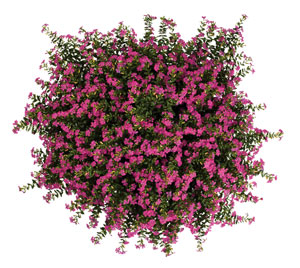1/1/2018
2018 AAS Winners Adds 11!
Ellen C. Wells
Making plant decisions for Spring 2018? Well, then All-America Selections (AAS) has some very worthy plant selections for you. Eleven new annual and edible varieties recently received 2018 AAS Winner status recently, joining three edibles that received that designation back in July. AAS Winners, as you know, have been trialed extensively against existing varieties that are considered best in class, so beating the best means something.
Five of those 11 varieties are annuals and they include:
Canna South Pacific Orange from Takii. Orange joins its sister and fellow AAS Winner South Pacific Scarlet. It’s compact and well suited for both landscapes and containers. The bonus with South Pacific varieties is that they’re grown from seed, which means less chance of it developing disease.
 Cuphea FloriGlory Diana from Westhoff (pictured). The vegetative cutting winner, this cuphea fits in anywhere—borders, mass plantings and containers. The judges loved it for its larger, profuse flowers with an intense magenta color.
Cuphea FloriGlory Diana from Westhoff (pictured). The vegetative cutting winner, this cuphea fits in anywhere—borders, mass plantings and containers. The judges loved it for its larger, profuse flowers with an intense magenta color.
Gypsophila Gypsy White Improved from Sakata. Gypsy White Improved has semi-double flowers on a slightly larger plant, making it sparkle in the garden. Judges appreciated it for better branching and growth habit, a longer bloom season and better heat tolerance.
Marigold Super Hero Spry from Benary. Super Hero Spry is a compact French marigold with dark maroon lower petals and golden yellow upper petals. Other than its good looks, it’s also got a uniform and stable pattern, it’s earlier to bloom and there’s no deadheading required.
Zinnia Queeny Lime Orange bred by Hugo Dittmar and available through Floragran. Its uniquely colored, dahlia-like blooms sit atop a sturdy and compact plant. The color actually changes from dark coral to peach and orange to a light peach. Queeny Lime Orange was the hands-down trial garden favorite of the visiting public.
The three national vegetable variety winners are:
Pak Choi Asian Delight from Seed Solutions of America. This Chinese cabbage wowed the judges, each noting that this variety didn’t bolt like the varieties it was compared to—even weeks after the others went to seed. This gives you a yield double or more of other varieties on the market. Heads are 5 to 7 in. with a tender white stem and dark green leaves.
Cayenne Pepper Red Ember from Johnny’s Selected Seeds. Red Ember, the judges say, is earlier to mature than comparison varieties, which is great for gardeners in northern climates with shorter growing seasons. It produces tons of rounded end fruits and medium-sized plants. Its walls are thick and spicy, but tastier than traditional cayenne.
Habañero Pepper Roulette from Monsanto/Seminis Home Garden. While Roulette resembles a traditional habañero pepper, it has NO heat. Rather, it has a citrusy flavor. Yield is up to 100 fruits per plant per season and produces earlier than comparative varieties.
The three regional vegetable winners are:
Hungarian Pepper Mexican Sunset from Seeds By Design. This Regional AAS winner is a charmer for its colors, which range from lime green to yellow, moving on to orange and red. Another early producer, these conical, thick-walled peppers have a touch of heat and can be used fresh, pickled or in dishes.
Tomato Chef’s Choice Red from Seeds By Design. Another Regional winner, Chef’s Choice Red produces globe-shaped, beefsteak-type tomatoes with firm flesh and a tasty acid-sugar ratio. Chef’s Choice Red produces on average 30 8-oz. fruits on 5-ft. indeterminate vines. It’s disease-resistant, too, and they claim it has a well-behaved form.
Tomato Valentine F1 from Johnny’s Selected Seeds. The judges all agreed this was the most appealing grape tomato they’ve trialed. It’s very sweet with a brix level of 7 to 9 and the fruits hold longer on the vine without cracking or losing flavor. Maturing in 55 days from transplant, Valentine’s firm flesh is meaty like a Roma, but in smaller, grape-sized fruit. Sounds like a great option for slow roasting. GP